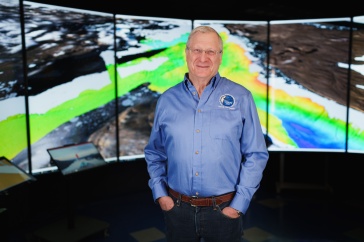
The energy-water microgrid on Appledore Island will serve as a model for island communities struggling with energy and freshwater insecurities. Photo by Collin Love.
For those who live on the stunningly beautiful islands and peninsulas within the Gulf of Maine, access to inexpensive, reliable energy and steady, clean drinking water can be something of a pipe dream. A new grant awarded to the University of New Hampshire will help those island communities — and others in rural and small coastal New England communities — to find viable solutions to their energy and freshwater insecurities using the renewable energy microgrid system that powers Shoals Marine Laboratory on Appledore Island as a model.
UNH will receive approximately $600,000 from the U.S. Economic Development Administration to conduct the work in collaboration with external industry partners and nonprofit organizations. Researchers hope these microgrid improvements will lead to enhanced economic resilience for the communities involved.
“This project will serve isolated, seasonal or year-round islanded communities looking to enhance their sustainability through the addition of energy and water microgrid systems,” says Diane Foster, director for the UNH School of Marine Science and Ocean Engineering and lead investigator for the project. “Our interdscipinary team draws on the expertise of staff and faculty within UNH Extension, Shoals Marine Laboratory and the College of Engineering and Physical Sciences. The partnership will allow us to translate technological advances to community looks for sustainable solutions.”
 |
| Students place solar panels on racks on Appledore Island. Photo by Jim Coyer. |
Island communities cobble together a patchwork of solutions to address their energy and water needs, often relying underwater cables, diesel generators, and limited island freshwater aquifers. These are unreliable and expensive options, though; Foster notes that Gulf of Maine island residents spend 16-18 percent of their median income on home heating and electricity, as compared to three percent nationally. In addition, many of the island inhabitants are self-employed, often working in the fishing or tourism sectors with limited resources and flexibility to adapt to changes in market demand. Taken as a whole, these communities need more viable, long-term solutions to their energy and water needs to improve their economic resilience, especially in the face of climate change.
Enter Shoals Marine Laboratory (SML), which has been dealing with such challenges for decades in order to serve the faculty, staff and students who spend their summers on the island, SML has worked to integrate renewable energy and water-saving solutions, including composting toilets, reverse osmosis and solar panels, into their system. As partners in this new project, SML’s focus will be on the development of an energy-water microgrid — essentially a power generation system where freshwater systems are integrated into a coordinated framework, explains Jennifer Seavey, executive director of SML.
SML does not currently have a control system in place to network and operate the power and water systems as one, Seavey says, so they will work with engineers to create a model and demonstrate to island communities how it can be done.
“Sustainability is a core value and strength at SML,” Seavey says. “We have been pushing sustainable engineering and practices forward for well over a decade. We have worked with regional partners to help them with their own sustainability infrastructure, and we are excited to enhance our capacity to bring sustainability to a wider audience and work with new collaborators that include economic development experts. This is the way to growth sustainability regionally and globally: problem solve, demonstrate and assist others.”
"If we can help remote communites offset the costs of energy by demonstrating technologies and addressing energy needs, we can make a huge impact on local economies and the region's ability to attract, retain, and launch enterprise."
Charlie French, leader of UNH Extension’s Community and Economic Development Program, is the engagement lead on the project. French will travel to these islanded communities to convene citizens and better understand their communities’ energy needs, as well as the barriers and opportunities for them to access more reliable and cost-effective options for clean energy and water, he says.
“One thing that we hear over and over from constituents in the communities we serve is the relatively high cost of energy in the Northeast,” French says. “That makes the cost of doing business more expensive, which hampers economic productivity. If we can help remote communities offset the costs of energy by demonstrating technologies and addressing energy needs, we can make a huge impact on local economies, and the region’s ability to attract, retain and launch enterprise.”
Extension’s role as a convenor is different than that of a consultant: French won’t tell communities what to do to solve their energy problems; rather, he’ll help them build their capacity and understanding to solve their own problems and leverage opportunities, he explains. Revolution Energy will be a key partner in introducing technology options to those islanded communities and serving the region’s energy needs.
“From this project I would like us to develop a roadmap for remote and island communities that puts the knowledge and power in their hands for making key decisions about energy and water infrastructure,” he adds.
The Institute for the Study of Earth, Oceans, and Space (EOS) is UNH's largest research enterprise, comprising six centers with a focus on interdisciplinary, high-impact research on Earth and climate systems, space science, the marine environment, seafloor mapping, and environmental acoustics, With more than $60 million in external funding secured annually, EOS fosters an intellectual and scientific environment that advances visionary scholarship and leadership in world-class research and graduate education.
-
Written By:
Rebecca Irelan | Institute for the Study of Earth, Oceans, and Space | rebecca.irelan@unh.edu | 603-862-0990
















































